When it comes to choosing a pet, size isn’t always the most important factor. While some people might dream of owning a big, fluffy dog or a majestic horse, others are drawn to the charm of miniature animals. These little companions can be just as loving, entertaining, and rewarding as their larger counterparts, and they often require less space and care. Let’s explore 14 miniature animals that make the best pets. Whether you’re living in a small apartment or simply have a soft spot for all things tiny, there’s sure to be a miniature animal on this list that will steal your heart.
1. Miniature Pigs: Charming Little Oinkers
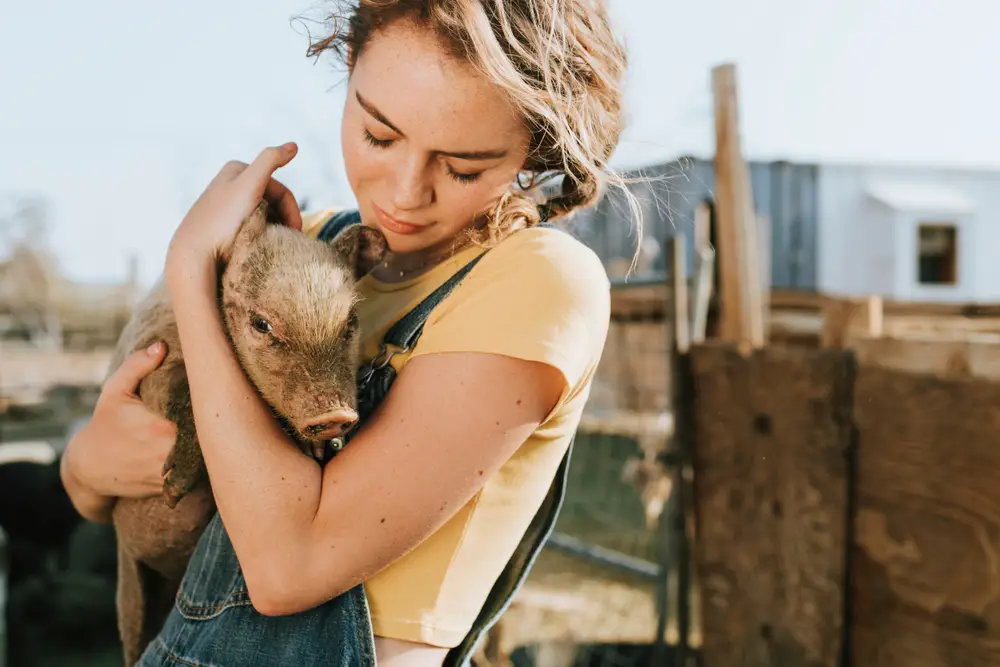
Miniature pigs, often referred to as teacup or micro pigs, are adorable little creatures that make excellent pets. They are known for their high intelligence, friendly nature, and social behavior. Pigs love to interact with their human companions, and they can even be trained to do tricks, much like dogs. Despite their size, they have big personalities and enjoy playing, exploring, and snuggling. It’s important to note that they require mental stimulation and can get bored if left alone for too long. Mini pigs also need a balanced diet to maintain their health and avoid obesity. According to the American Mini Pig Association, a proper diet and routine veterinary care are essential to ensure the well-being of these delightful creatures.
Miniature pigs are relatively low-maintenance compared to larger pets, but they do require some specific care. They should have a safe outdoor space to root around and exercise, as well as a comfortable indoor area where they can relax. Pigs are also very clean animals and can be litter trained, which makes them a suitable option for indoor living. They enjoy socializing with other animals or humans, so consider having more than one pig if you can. It’s also worth mentioning that pigs can be a bit noisy and stubborn at times, so patience and proper training are key. Overall, miniature pigs can bring joy and laughter to any home if you’re prepared for their unique needs.
2. Dwarf Rabbits: Hopping Bundles of Joy
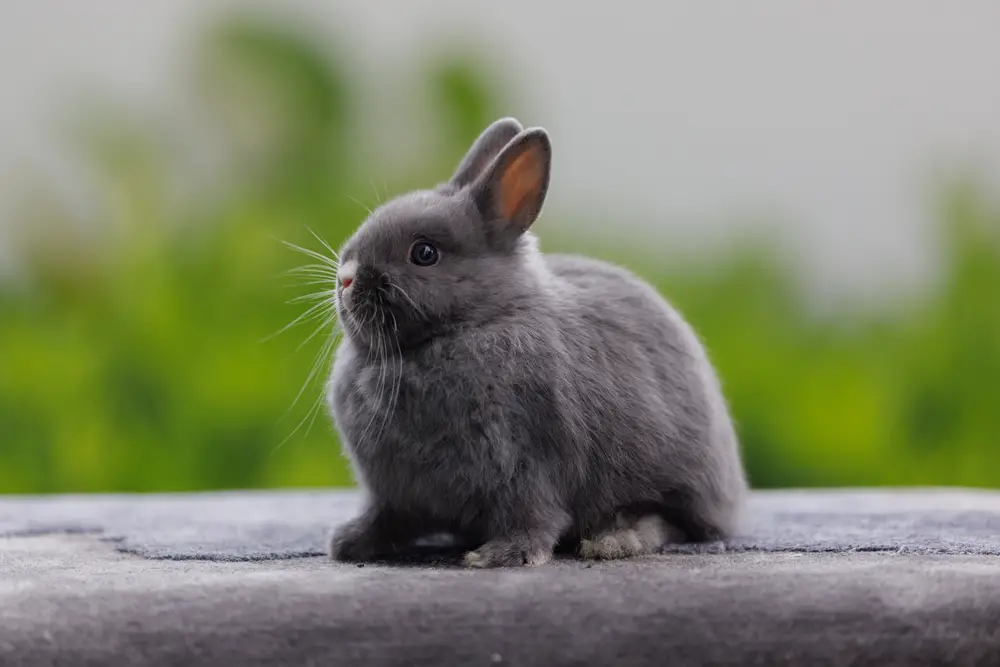
Dwarf rabbits are one of the most popular miniature pets due to their compact size and endearing nature. These rabbits are smaller than typical rabbits, making them ideal for homes with limited space. They come in a variety of colors and breeds, such as the Netherland Dwarf and the Mini Lop, each with its own distinct personality and appearance. Dwarf rabbits are known for being gentle, social, and relatively easy to care for. They thrive on interaction and can form strong bonds with their human companions, enjoying petting and gentle handling. A diet rich in hay, fresh vegetables, and quality pellets will keep them healthy and satisfied. Housing a dwarf rabbit involves a secure cage or pen with enough space for them to hop around, as well as regular out-of-cage playtime.
When it comes to hygiene, dwarf rabbits are quite clean and can be litter trained, making them a convenient choice for indoor living. They also groom themselves regularly, but occasional brushing will help keep their coats in good condition and minimize shedding. These little lagomorphs are generally quiet pets, but they can express themselves through various sounds and body language. According to House Rabbit Society understanding these behaviors is key to ensuring your rabbit is happy and healthy. Social creatures by nature, they enjoy the company of other rabbits or attentive humans. If considering a rabbit companion, take the time to learn about their care requirements and be prepared to provide them with the love and attention they deserve.
3. Miniature Horses: Tiny Equine Companions
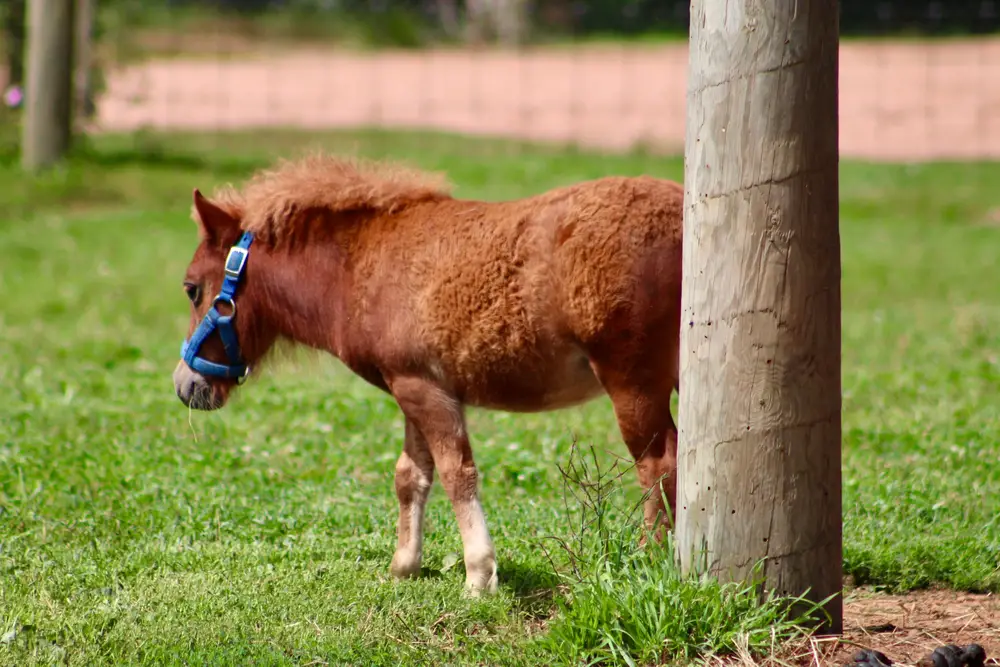
Miniature horses are small versions of their larger counterparts, loved for their sweet nature and manageable size. These equines are often kept as pets due to their gentle temperament and social disposition. Standing at about 34-38 inches tall, miniature horses are suitable for families with children and those looking for a unique pet experience. They require ample space to roam and graze, similar to larger horses, but their small stature makes them a bit easier to handle. Miniature horses are intelligent and can be trained for various activities, including therapy work and cart pulling. A diet of hay, pasture, and specialized feeds will keep them healthy and happy. Regular grooming and hoof care are essential to maintain their health and appearance.
Miniature horses thrive on social interaction, both with humans and other horses. They can live indoors in a barn or outdoors with proper shelter and fencing. While they are generally hardy animals, they do require routine veterinary care and vaccinations. Miniature horses can be wonderful companions for those who have the time and resources to dedicate to their care. Additionally, they can live for many years, offering long-term companionship. According to The AMHA, these horses can be affectionate, loyal, and form strong bonds with their caretakers. If you’re considering adding a miniature horse to your family, ensure you have the space, commitment, and knowledge to provide them with a loving home.
4. Pygmy Goats: The Playful and Hardy Pets
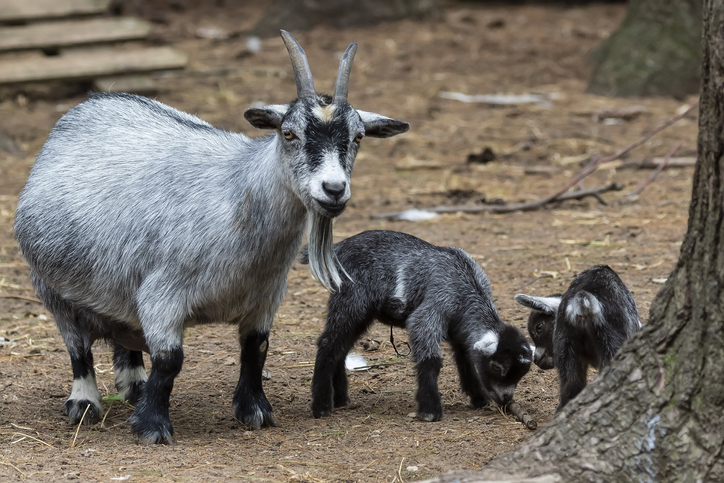
Pygmy goats are delightful miniature animals known for their playful and sociable nature. These goats are much smaller than standard goats, with compact bodies and endearing personalities. They can be kept as pets in both rural and suburban areas, provided there is enough outdoor space for them to roam. Pygmy goats are very curious and enjoy exploring their surroundings, making them a joy to watch and interact with. They’re also quite intelligent and can be trained to follow simple commands or navigate obstacle courses. Their social nature means they thrive on companionship, whether it’s with humans or other goats. A balanced diet of hay, pasture, and goat feed will keep them healthy.
In terms of care, pygmy goats require secure fencing to protect them from potential predators and to prevent them from escaping. They need regular hoof trimming and check-ups to maintain their health. These goats are hardy and can adapt to various climates, but providing them with shelter from extreme weather is essential. While they are generally low-maintenance, they do enjoy a clean environment, so regular cleaning of their living area is necessary. Pygmy goats can make great pets for families, offering entertainment and companionship. They also have a relatively long lifespan, often living 10-15 years, which means they can be a long-term addition to your family. Consider adopting multiple goats to keep them company and ensure they lead happy, fulfilling lives.
5. Miniature Donkeys: Gentle and Loving Friends
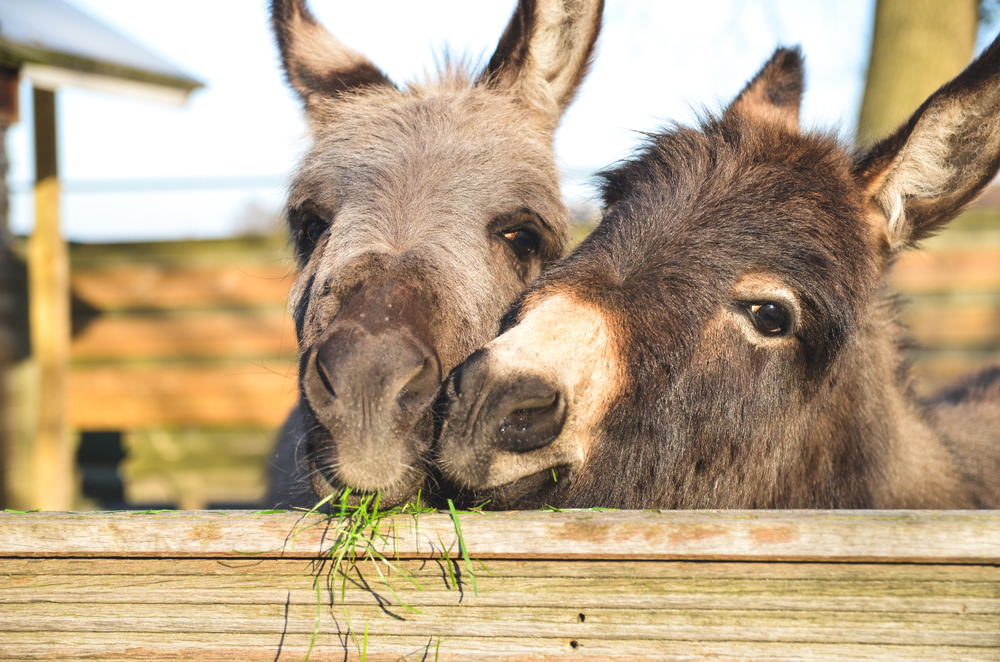
Miniature donkeys are charming creatures that make affectionate and gentle pets. Known for their calm demeanor and friendly nature, these donkeys are much smaller than standard donkeys, standing at around 36 inches tall. They can form deep bonds with their human companions and other animals, making them excellent pets for families with children. Miniature donkeys are intelligent and enjoy learning new behaviors, such as responding to commands or engaging in light work. Their small size doesn’t take away from their strength, as they are capable of carrying small loads or participating in activities like cart pulling. These donkeys thrive on social interaction and require companionship, whether from humans or other donkeys. Their diet mainly consists of hay and pasture, supplemented with grains or donkey-specific feeds as needed.
Miniature donkeys need adequate outdoor space to roam and graze, with secure fencing to keep them safe. They require regular grooming, particularly for their hooves, and routine veterinary care to maintain good health. Shelter from harsh weather conditions is essential, even though they are generally hardy animals. Miniature donkeys can live up to 25-35 years, offering long-lasting companionship. They are known for their gentle and loving nature, making them suitable for pet therapy or emotional support roles. While they can adapt to most environments, they do thrive best in a space where they can roam freely. If you’re considering a miniature donkey as a pet, be prepared to provide the time and resources needed to ensure they live a happy and healthy life.
6. Miniature Dachshunds: The Lovable Sausage Dogs

Miniature dachshunds are among the most beloved small dog breeds, known for their playful yet stubborn nature. These dogs are smaller versions of the standard dachshund, with the same elongated bodies and short legs that make them instantly recognizable. Their personalities are often larger than life, with a love for adventure and a strong-willed disposition. Miniature dachshunds are incredibly loyal to their owners and tend to form strong bonds with family members. They make excellent companions for those who enjoy an active lifestyle, as they love going for walks and playing games. Despite their small size, they have a surprisingly loud bark and can be quite protective, making them good watchdogs.
In terms of care, miniature dachshunds require regular exercise to prevent obesity and keep them healthy. Their diet should be balanced with high-quality dog food appropriate for their size and activity level. Due to their long backs, they are prone to spinal issues and should be discouraged from jumping on and off furniture. Dachshunds thrive on social interaction and can experience separation anxiety if left alone for extended periods. Regular grooming is needed to keep their coats in good condition, especially for long-haired varieties. They generally adapt well to different living situations, whether in a house or an apartment. If you’re considering a miniature dachshund, be ready for a pet that is as loving as it is energetic.
7. Miniature Schnauzers: The Spirited and Intelligent Companions
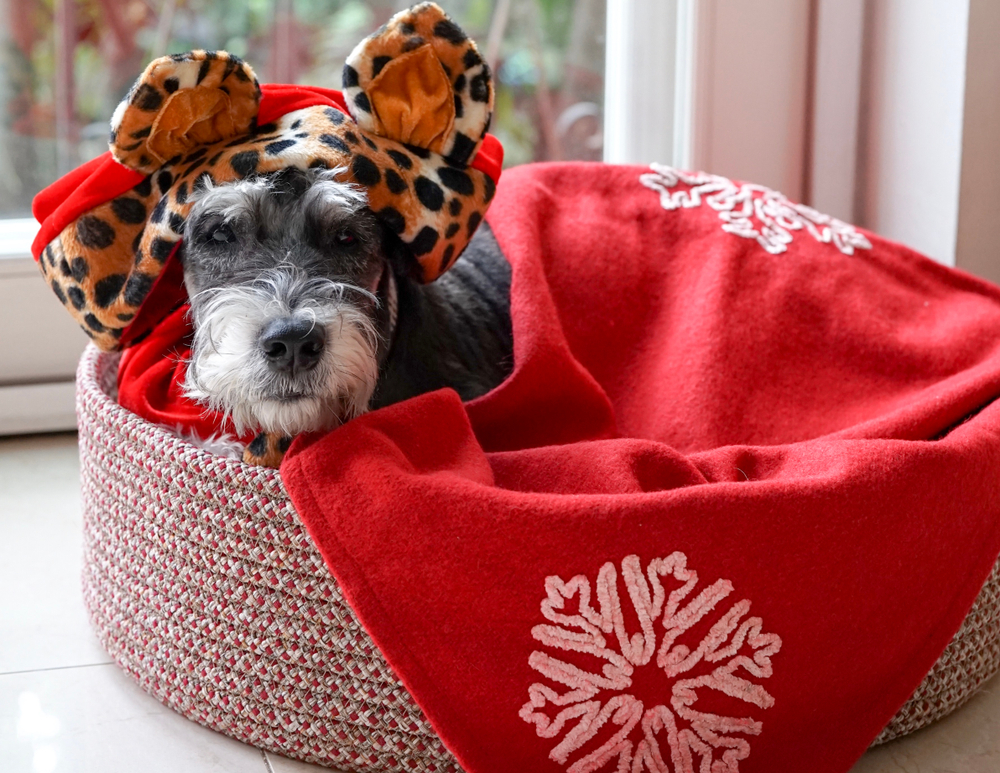
Miniature schnauzers are delightful little dogs known for their intelligence, energy, and distinctive bearded faces. These small dogs are a reduced version of the standard schnauzer, yet they exhibit the same spirited personality and eagerness to please. They are known for their alertness, making them great watchdogs despite their small size. Miniature schnauzers are highly trainable and enjoy engaging in activities such as obedience, agility, and trick training. They are particularly good for families, as they tend to get along well with children and other pets. Their playful and outgoing nature often keeps everyone entertained and on their toes.
Caring for a miniature schnauzer involves regular grooming to maintain their characteristic beard and eyebrows. They have a double coat that requires frequent brushing to prevent matting, as well as regular trips to the groomer for trimming. These dogs require a balanced diet to maintain their health and energy levels, along with daily exercise to keep them physically and mentally stimulated. Miniature schnauzers are relatively adaptable and can live comfortably in various environments, from apartments to larger homes with yards. They thrive on companionship and can develop strong bonds with their human families. If you’re looking for a lively and loving small dog, a miniature schnauzer might just be the perfect match for you.
8. Miniature Cows: The Gentle Giants in Tiny Packages
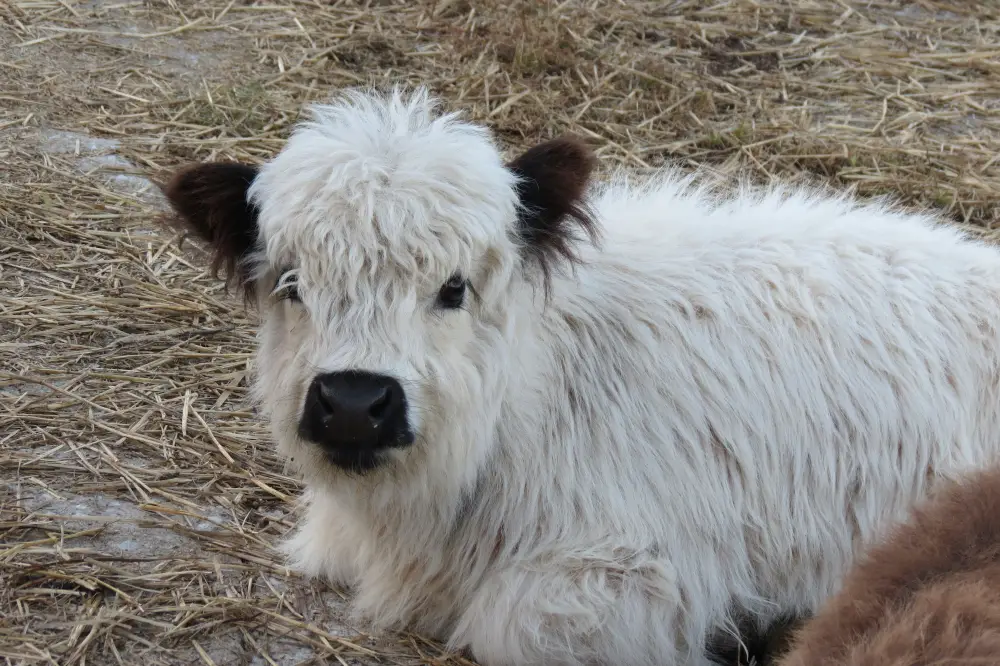
Miniature cows are an emerging trend in the world of pets, known for their docile nature and manageable size. These petite bovines are smaller versions of standard cows, often reaching just 36-42 inches in height. They are affectionate animals that can form strong bonds with their human caregivers, making them excellent companions. Miniature cows are often kept for their milk, although many people enjoy them simply for their friendly and calm demeanor. Their small size means they require less space and feed compared to larger cows, making them more practical for small farms or hobbyists. These cows are social animals and thrive in environments where they have other animals or companions around them.
When it comes to care, miniature cows need a proper diet consisting of high-quality hay, pasture, and supplemental grains or cow feeds. They require regular veterinary check-ups to ensure they remain healthy and free from diseases. Providing them with a clean and comfortable shelter is essential, especially in harsh weather conditions. Miniature cows are generally hardy and adapt well to various climates. They have a lifespan of 12-20 years, which means they can be a long-term commitment for those ready to take on the responsibility. Whether you’re interested in their milk production or just enjoy their company, miniature cows can make a delightful addition to your family.
9. Miniature Shetland Ponies: The Adorable Small Equines
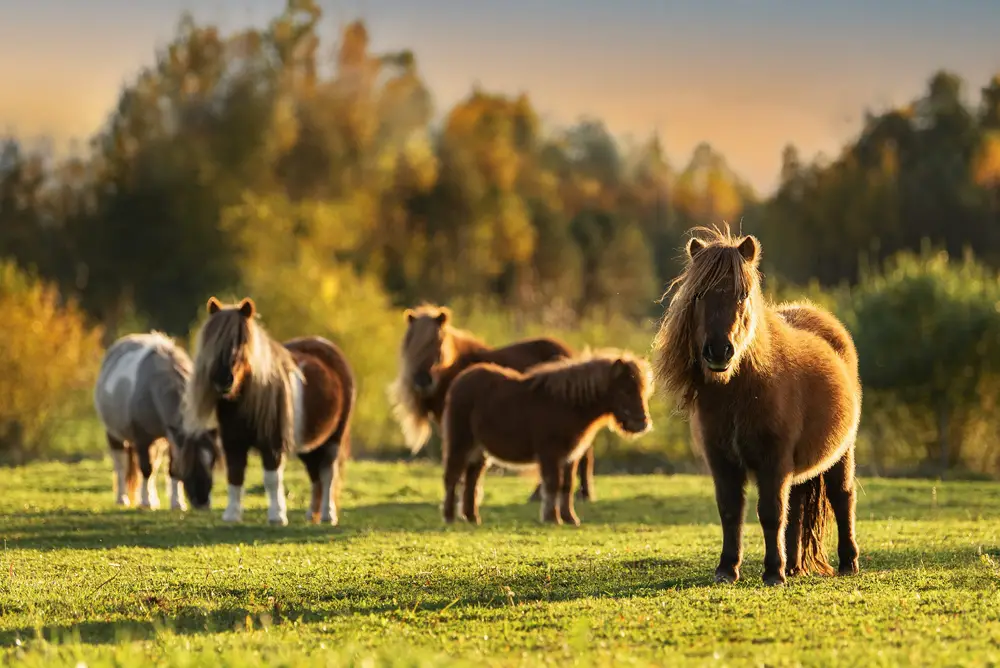
Miniature Shetland ponies are small, sturdy equines that capture the hearts of many with their adorable appearance and gentle nature. These ponies are a downsized version of the traditional Shetland pony, known for their resilience and strength despite their small stature. Often standing at just 28-34 inches tall, miniature Shetland ponies are great companions for children and adults alike. They are known for their calm, friendly demeanor and can form strong bonds with their human caretakers. These ponies enjoy human interaction and can participate in various activities, such as riding for small children, cart pulling, or even therapy work.
Caring for a miniature Shetland pony involves providing them with ample space to roam and graze, along with secure fencing to ensure their safety. Their diet should consist mainly of hay and pasture, supplemented with pony-specific feeds when necessary. Regular grooming, hoof care, and veterinary check-ups are crucial to maintaining their health. While they are generally hardy animals, they do require shelter from extreme weather conditions. Miniature Shetland ponies can live up to 30 years, offering long-lasting companionship to those who choose to care for them. They thrive in a social environment, whether with other ponies or attentive humans, making them a delightful addition to any home prepared for their needs.
10. Miniature Hedgehogs: The Spiky Little Charmers
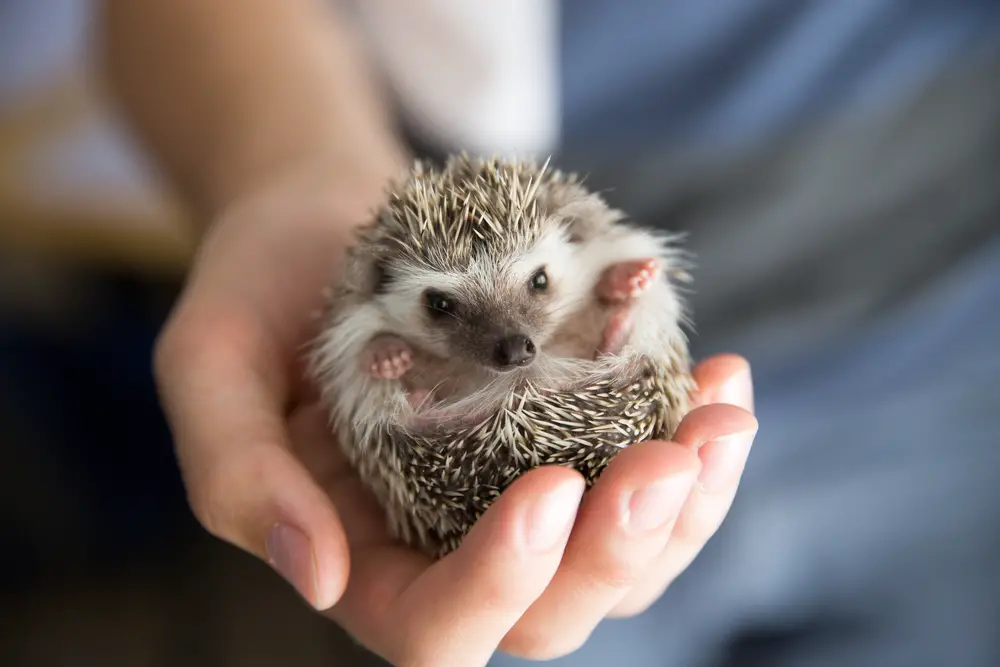
Miniature hedgehogs, particularly the African Pygmy hedgehog, are increasingly popular as unique and exotic pets. These small, nocturnal animals are known for their distinctive spiky appearance and curious nature. Despite their prickly exterior, miniature hedgehogs can be quite friendly and social with proper handling and care. They are solitary creatures by nature but can form bonds with their human caretakers if given time and patience. Hedgehogs enjoy exploring their environment and can be quite playful, especially with toys or tunnels. Their diet should consist of high-quality hedgehog food, supplemented with insects, fruits, and vegetables.
Caring for a miniature hedgehog involves providing them with a suitable habitat equipped with bedding, hiding spots, and exercise wheels. Maintaining a clean environment is essential to prevent health issues, and regular nail trimming is necessary to keep them comfortable. Hedgehogs are sensitive to temperature changes, so ensuring a stable, warm environment is crucial for their well-being. These small creatures are generally low-maintenance and can adapt to various living situations, making them suitable for pet enthusiasts with limited space. Their lifespan ranges from 3-5 years, offering a relatively short-term commitment for those interested in owning an exotic pet. If you’re considering a miniature hedgehog, be prepared for a pet that is as intriguing as it is adorable.
11. Miniature Chickens: The Petite Poultry Pals
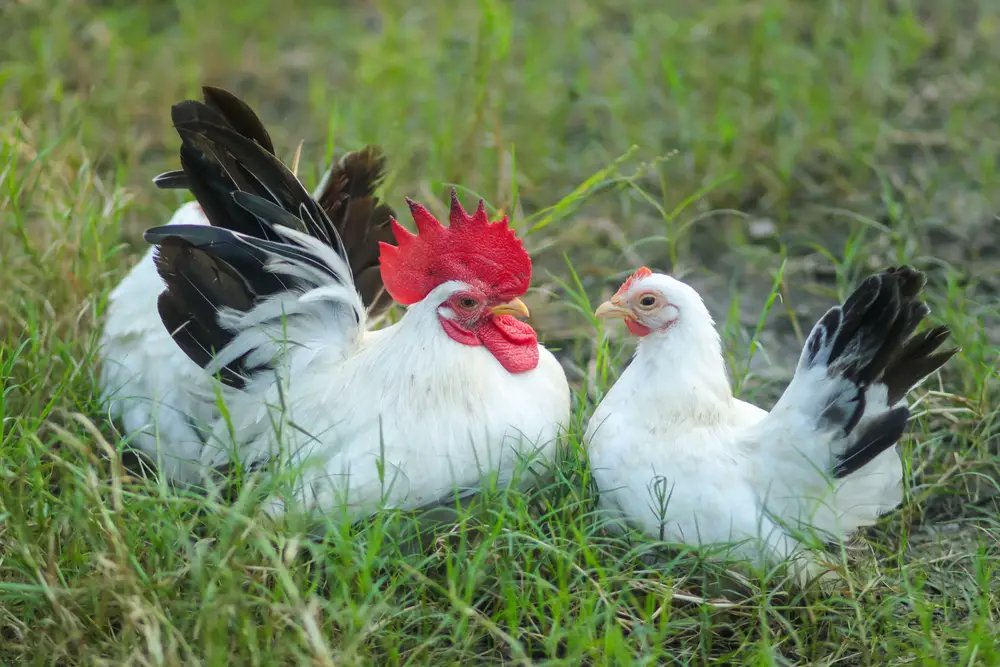
Miniature chickens, often referred to as bantams, are small versions of standard chicken breeds and are cherished for their size and charm. These little birds are perfect for those who want to keep chickens but have limited space, as they require less room while still providing fresh eggs. Miniature chickens come in a variety of breeds, each with its own distinct appearance and personality. They are generally friendly and social animals, making them a delightful addition to any backyard flock. Bantams are also known for their hardiness and ability to adapt to various climates, though they still require protection from harsh weather.
Caring for miniature chickens involves providing them with a secure coop and outdoor space for foraging and dust bathing. Their diet should consist of chicken feed, supplemented with grains, vegetables, and occasional treats. Regular cleaning of their living area is necessary to prevent disease and ensure their health. Miniature chickens are relatively low-maintenance pets that can live for 5-7 years, providing companionship and fresh eggs throughout their lifespan. They thrive in a flock environment, so consider keeping more than one to satisfy their social needs. Whether you’re interested in their egg production or simply enjoy their company, miniature chickens can be a rewarding addition to your home.
12. Miniature Lop Rabbits: The Sweet Floppy-Eared Companions
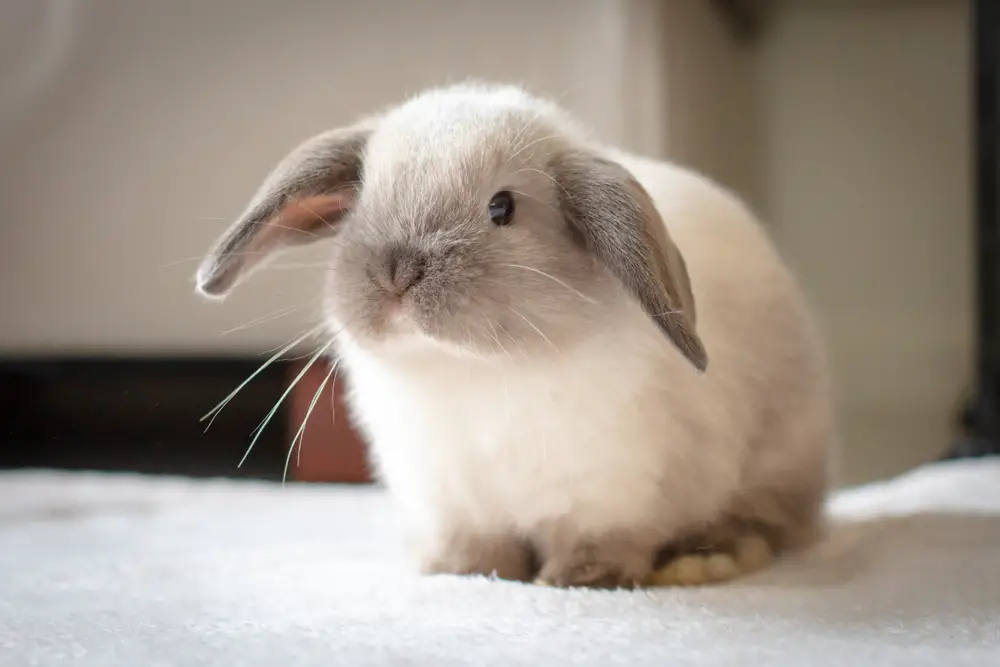
Miniature Lop rabbits are a popular choice for those seeking a small, gentle pet with a distinctive appearance. These rabbits are known for their characteristic lop ears, which hang down the sides of their head, giving them an endearing look. They are smaller than standard rabbits, making them well-suited for homes with limited space. Miniature Lops are social animals that thrive on interaction and can form strong bonds with their human companions. They enjoy being petted and handled gently and can be quite playful when given toys or space to explore. Their diet should include a mix of hay, fresh vegetables, and quality rabbit pellets to maintain their health.
Caring for a Miniature Lop rabbit involves providing them with a secure cage or pen, along with regular out-of-cage time for exercise and play. They are generally clean animals and can be litter trained, making them suitable for indoor living. Regular grooming is needed to keep their fur in good condition and minimize shedding. They also require routine veterinary check-ups to ensure they remain healthy. Miniature Lop rabbits can live up to 7-12 years, offering long-term companionship for those prepared to meet their needs. If you’re considering adding a Miniature Lop to your family, be ready to provide them with the love, attention, and care they deserve.
13. Miniature Ferrets: The Playful and Curious Explorers
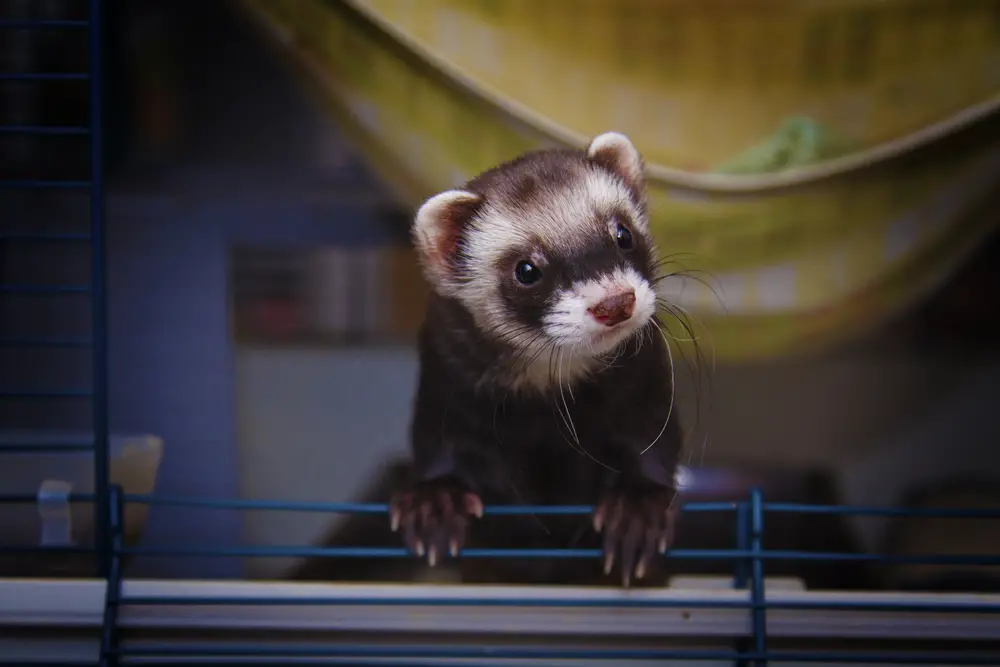
Miniature ferrets, often simply referred to as ferrets, are lively and inquisitive creatures that make entertaining pets. Although not technically classified as “miniature,” their small, elongated bodies and playful nature make them a delightful addition to homes seeking a unique pet. Ferrets are known for their mischievous personalities and love to explore their surroundings, often getting into everything they can find. They are social animals that enjoy interaction with their human companions and other ferrets, making them ideal for families or individuals who can provide the attention they crave. Their diet should be rich in protein and fat, typically consisting of high-quality ferret food or specially formulated cat food.
Caring for a ferret involves providing them with a spacious cage and plenty of out-of-cage time to explore and play. They require regular cleaning of their living area to prevent odor and maintain a healthy environment. Toys, tunnels, and interactive play are essential to keep them mentally and physically stimulated. Ferrets are generally low-maintenance pets but do need regular veterinary care, including vaccinations and check-ups. They are adaptable and can live in various environments, provided they have room to move and explore. With a lifespan of 6-10 years, ferrets can be a long-term commitment for those ready to embrace their energetic and curious nature.
14. Miniature Turtles: The Tiny, Tranquil Reptiles
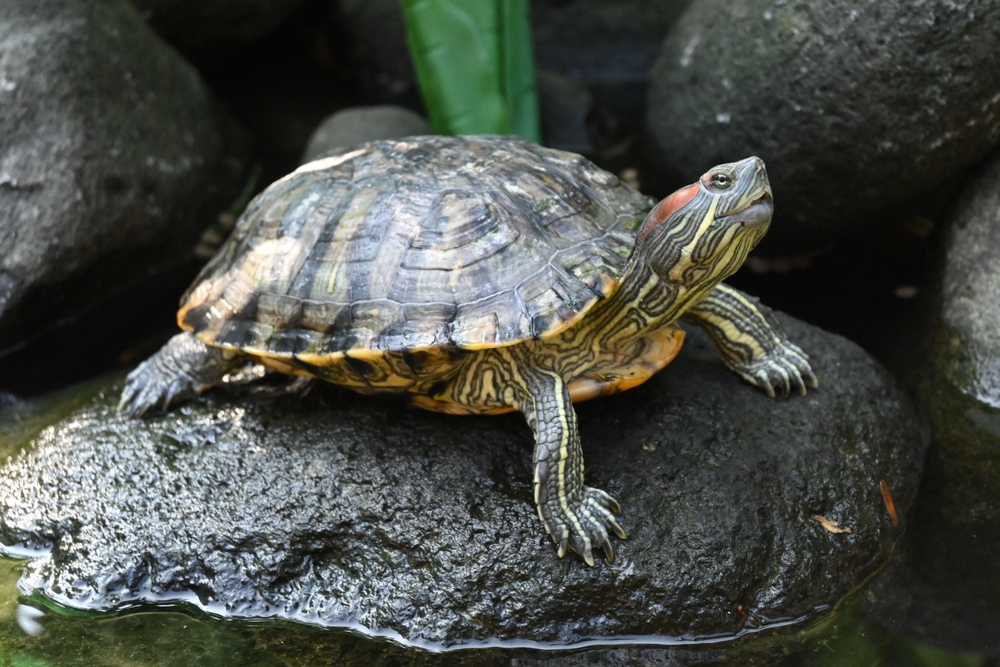
Miniature turtles, such as the popular Red-Eared Slider or the Musk Turtle, are small reptiles that captivate pet enthusiasts with their serene presence. These turtles are much smaller than their larger counterparts, making them suitable for indoor aquariums or small outdoor ponds. They are relatively low-maintenance pets, ideal for those who appreciate reptiles but may not have space for larger species. Turtles are known for their slow-paced lifestyle and can be quite calming to observe as they swim or bask in their habitat. Their diet typically includes turtle pellets, supplemented with fresh vegetables, insects, or small fish.
Caring for a miniature turtle involves setting up an appropriate habitat, complete with water for swimming, a basking area, and UVB lighting to support their health. Regular cleaning of their enclosure is necessary to prevent disease and maintain water quality. Turtles require a calm environment with minimal handling, as they are more observational pets rather than interactive companions. With a lifespan of 20-40 years, miniature turtles can be a long-term commitment for those prepared to provide for their needs. If you’re considering a miniature turtle, ensure you have the knowledge and resources to create a healthy and enriching environment for these tranquil creatures.
